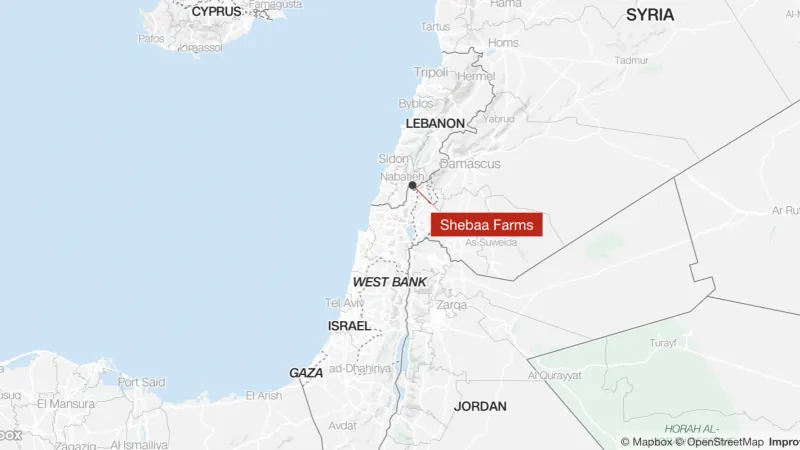
Escalating Violence: Israel's Strikes in Southern Lebanon Challenge Fragile Ceasefire
2024-12-03
Author: Chun
Overview of Recent Events
In a disastrous turn of events, Israeli airstrikes in southern Lebanon resulted in the deaths of at least nine individuals, marking the deadliest day since the ceasefire brokered by the United States and France was implemented just a week ago. The Lebanese Health Ministry confirmed that five casualties occurred in the town of Haris and four in Tallousa, while three others sustained injuries during the bombardment.
Ceasefire Status
Despite this latest escalation, the tenuous ceasefire between Israel and Hezbollah, the Iran-backed militant group, seemed to be holding on, albeit precariously. Both parties accused each other of violating the terms of the truce. Hezbollah responded to Israeli strikes with the launch of two projectiles towards territories occupied by Israel, though no injuries were reported from the Israeli military on their part.
Israeli Response
In retaliation, Israeli Prime Minister Benjamin Netanyahu declared his intent to respond firmly to Hezbollah's actions, which he labeled a significant breach of the ceasefire. The Israel Defense Forces (IDF) initiated airstrikes targeting what they described as “Hezbollah terrorists” and their military infrastructure across Lebanon. They cited ongoing threats to Israeli civilians as justification for these attacks, despite the ceasefire agreement.
International Reactions
This situation has drawn warnings from both the United States and France, who asserted that Israel has violated the ceasefire numerous times since it took effect. A United Nations peacekeeping source indicated that there have been approximately 100 breaches reported.
Debates Over Violations
The Israeli Foreign Minister, Gideon Sa’ar, argued that Israel is adhering to the ceasefire by demanding Hezbollah’s withdrawal from the border area, describing their presence as a core violation of the agreement. Hezbollah's counter-argument accused Israel of multiple aggressions, including airstrikes on civilian areas and violations of Lebanese airspace.
Territorial Disputes
The tensions are further complicated by the ongoing Israeli operations in areas with historical significance such as Shebaa Farms, which Israel captured during the 1967 war. The territorial disputes here complicate the conflict and fuel existing animosities.
Outlook
As the fragile ceasefire remains under threat, both sides continue to exchange accusations, risking escalation. A senior Israeli official reiterated their commitment to take unilateral action against Hezbollah's alleged violations despite these not being explicitly outlined in the ceasefire agreement.
Diplomatic Efforts
The US State Department remains cautiously optimistic, stating that although violations have occurred, the ceasefire has not collapsed. A 60-day cessation of hostilities was agreed upon, intending to lay the groundwork for a more enduring peace, with discussions centered on stronger supervision of Hezbollah’s movements to avoid future conflicts.
Historical Context
The complex dynamics of this situation follow decades of longstanding tensions rooted in territorial disputes and military confrontations. As international stakeholders like the UN continue to monitor the ceasefire, the prospect of lasting peace remains uncertain as both parties grapple with their longstanding grievances.
Conclusion
This situation is evolving rapidly, and all eyes will be on the developments over the coming days as diplomatic efforts may hold the key to stabilizing this volatile region.




 Brasil (PT)
Brasil (PT)
 Canada (EN)
Canada (EN)
 Chile (ES)
Chile (ES)
 España (ES)
España (ES)
 France (FR)
France (FR)
 Hong Kong (EN)
Hong Kong (EN)
 Italia (IT)
Italia (IT)
 日本 (JA)
日本 (JA)
 Magyarország (HU)
Magyarország (HU)
 Norge (NO)
Norge (NO)
 Polska (PL)
Polska (PL)
 Schweiz (DE)
Schweiz (DE)
 Singapore (EN)
Singapore (EN)
 Sverige (SV)
Sverige (SV)
 Suomi (FI)
Suomi (FI)
 Türkiye (TR)
Türkiye (TR)